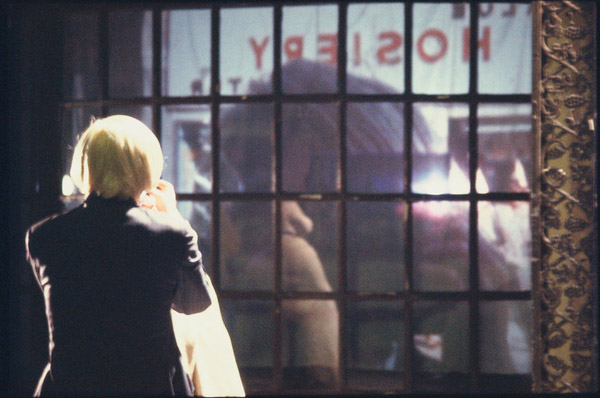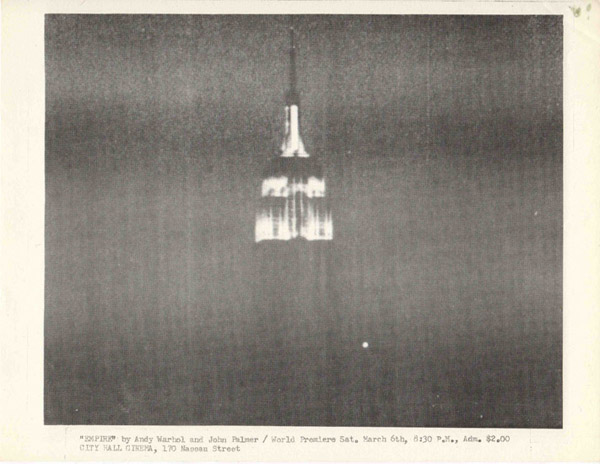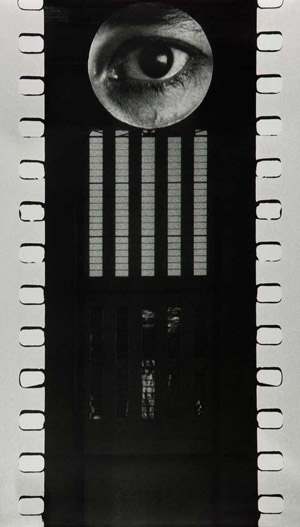
We have to begin in New York, because I just love this piece that Amy Taubin‘s written for Artforum. “For just under a week, Anthology Film Archives serves as the downtown annex of the Whitney Museum’s Rituals of Rented Island exhibition,” she begins. “I am not the ideal viewer for the Whitney exhibition, subtitled Object Theater, Loft Performances, and the New Psychodrama—Manhattan, 1970–1980…, for the simple reason that I ‘experienced’ almost all the pieces in the show when they were presented as live performance or were screened hot off the Portapak or Super 8 camera, almost always with the artist present. Though I may complain about getting old, I also am still thrilled by the memories of Jack Smith’s afterhours performances in his Grand Street loft, Michael Smith’s ‘Baby Ikki’ pieces at The Kitchen, Vito Acconci masturbating under a ramp cut into the floor of the Sonnabend gallery, and Richard Foreman and Robert Wilson’s glacially paced plays with their strategically placed eruptive visuals.” Taubin was the video and film curator at The Kitchen in the mid-80s, and you simply must read on.
The Whitney’s exhibition is on view through February 2, but the Anthology series, Further Rituals of Rented Island, is only on through Tuesday. Writing for BOMB, Nicholas Elliott recommends one film screening on Monday: “Chantal Akerman’s News from Home [1977] unfolds in a series of exactingly composed shots of New York streets in the 1970s, when Manhattan was a borough of bialys, not Cronuts; of decay, not decadence. This is cinematic beauty on an elemental level, with cinema as the recording of what will one day be gone and the beauty as a presence that announces its disappearance.”
Blake Gopnik is currently writing a biography of Andy Warhol, and since, in honor of the film’s 50th anniversary, the James Fuentes gallery is screening Empire in its entirety through January 26, Gopnik naturally felt obliged to go an take in all eight hours. “You’d expect that after Hour 3 or 4 of Empire, you’d be ready to slit your wrists,” he writes in the New York Times, “but the movie turns out to be gripping. If great works of art can be thought of as machines for thinking, triggering ideas by the dozen, then Empire is a Rolls-Royce: It keeps us thinking about what film is and does, what great buildings are all about and even how and why we look at things. Jotting down my thoughts minute by minute, I ended up writing more than 5,000 words.”
“From 1938 to 1991, Soviet filmmakers accomplished a singularly bizarre feat,” writes Stuart Weinstock at Cinespect. “They produced the first feature film narratives to address Nazi anti-Semitism while, thanks to a powerful film censorship apparatus, saying very little about the Holocaust. (eldiariony.com) The few films that broached the topic and the films that never advanced beyond a screenplay are the focus of Olga Gershenson’s illuminating new book, The Phantom Holocaust: Soviet Cinema and Jewish Catastrophe. Gershenson, a professor of Judaic and Near Eastern Studies at the University of Massachusetts Amherst, devotes an early chapter of her book to Professor Mamlock, a 1938 Soviet film about a Jewish doctor whose sympathies shift to the communist underground after experiencing Nazi persecution. A newly restored print of Professor Mamlock will screen at the Walter Reade Theater on Monday, January 20 as part of the 2014 New York Jewish Film Festival.”
Green Porno, Isabella Rossellini’s one-woman stage adaptation of her Sundance series, is on at BAM through January 25. She’s a guest on the Leonard Lopate Show; and for Artforum, Rhonda Lieberman reports on a recent conversation Rossellini had with animal behaviorist Diana Reiss the Rubin Museum.
The Aesthetic of Fragment is an evening of nonfiction films and video happening at UnionDocs on Saturday. At the L, Aaron Cutler recommends Soon-Mi Yoo’s Dangerous Supplement (2005). Then on Sunday, he suggests heading over to Anthology Film Archives to see Yvonne Rainer’s Film About a Woman Who… (1974).
Los Angeles. “Filmforum is delighted to welcome back New York filmmaker Lynne Sachs with the Los Angeles premieres of two of her unique works. Moving regularly through the different possibilities of documentary and narrative approaches, Sachs finds the simple beauties and underlying social tensions of people trying to form their places in the world. Quietly empathetic with people often overlooked, and easily conversant with all the tools of filmmaking, each work from Sachs offers up a new way of looking at people and a new way of thinking about film.” The Last Happy Day (2009) and Wind in Our Hair (Con viento en el pelo, 2010) screen on Sunday at the Egyptian. Then, on Monday, Sachs and cinematographer Sean Hanley will present Your Day Is My Night (2013) at REDCAT.
San Francisco. “It’s January,” writes Nicole Gluckstern in the Bay Guardian, “and our premiere German language film festival, Berlin and Beyond, is back to its rightful place on the cinematic calendar after a year off for regrouping, kicking off the neues Jahr with films from Germany, Austria, and Switzerland—as well as Turkey and France.” Through Sunday.
Copenhagen. Tacita Dean – Print Projects opens today at the Statens Museum for Kunst. Through May 18.
For news and tips throughout the day every day, follow @KeyframeDaily on Twitter and/or the RSS feed. Get Keyframe Daily in your inbox by signing in at fandor.com/daily.





